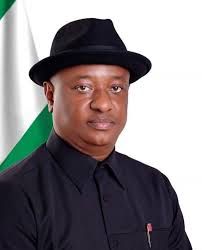Federal Government To Release Broadband Spectrum 2015
As Nigeria intensifies efforts towards a seamless transition from analogue to digital terrestrial broadcasting in 2015, the Federal Government is finalizing arrangements to ensure availability and release of spectrum for broadband deployment after the switchover.
Also, it has concluded plans to provide subsidy of up to 6000kms for operators willing to roll out broadband infrastructure in the rural areas between now and next year.
Similarly, government is facilitating full rollout by 3g network operators with the potential for immediate transition to 4g/lte as spectrum becomes available.
Minister of Communication Technology, Mrs. Omobola Johnson, briefing newsmen in Abuja yesterday on the 2014 World Telecommunication and Information Society Day celebration, said it is expedient for the nation to roll out high-speed broadband networks to make it affordable and a universally accessible tool to fast-track sustainable development.
She observed that the transformative benefits of having broadband available to all include improved learning, increased job creation, better community and civic engagement, improved trade and commerce, and a positive impact on the Gross Domestic Product (GDP).
According to her, mobile broadband subscription may reach 10 billion by end of decade, while the key objectives of the national broadband plan are to promote pervasive broadband deployment, increase broadband adoption and usage, and ensure availability of broadband services at affordable rates in order to maximize its socio-political and economic benefits to the people.
“It is intended over the period of this plan to see more than a five-fold increase in internet and broadband penetration figures as well as ensure that state capitals and urban cities have metro fibre infrastructure installed,” she noted. “Certain estates and business districts within major cities shall have fibre to the home or premises.”
To increase broadband accessibility, she disclosed, the present administration auctioned 30mhz on the 2.3ghz frequency band, with a further arrangement to auction 2.5ghz band frequency spectrum.
“The telephone subscriber figure for Nigeria as at the end of February 2013 was 116,601,637 active lines. The four active GSM operators have about 96 percent market share while the three active CDMA operators have the rest,” she said.
“2g mobile coverage is at 98 percent but 3g coverage, which is mostly concentrated in urban areas, is very limited at less than 35 percent. Internet penetration is quoted at 33 percent and broadband penetration is at 6 percent. Though the Internet was first introduced in Nigeria in 1996, no appreciable uptake was recorded until further opening of the market in 2001.
“The slow uptake of Internet has been largely attributed to network infrastructure deficiency, among other factors. Nigeria currently boasts primary fibre optic backbone infrastructure presence in all the 36 states and the Federal Capital Territory, with most fibre infrastructure concentrated in state capitals and a few urban centers.”
Johnson explained that government’s policy goal recognizes the immense socio-economic importance of broadband services to national development and therefore seeks to ensure that the infrastructure necessary to provide ubiquitous broadband services is available and accessible to all citizens at affordable rates.
She noted that broadband connectivity is a critical element today in ensuring that information and communication technologies are used as effective delivery vehicles for health, education, governance, trade and commerce in order to achieve sustainable socio-economic growth.



